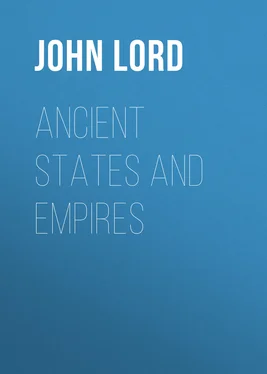John Lord - Ancient States and Empires
Здесь есть возможность читать онлайн «John Lord - Ancient States and Empires» — ознакомительный отрывок электронной книги совершенно бесплатно, а после прочтения отрывка купить полную версию. В некоторых случаях можно слушать аудио, скачать через торрент в формате fb2 и присутствует краткое содержание. Жанр: foreign_prose, История, foreign_edu, foreign_antique, на английском языке. Описание произведения, (предисловие) а так же отзывы посетителей доступны на портале библиотеки ЛибКат.
- Название:Ancient States and Empires
- Автор:
- Жанр:
- Год:неизвестен
- ISBN:нет данных
- Рейтинг книги:4 / 5. Голосов: 1
-
Избранное:Добавить в избранное
- Отзывы:
-
Ваша оценка:
- 80
- 1
- 2
- 3
- 4
- 5
Ancient States and Empires: краткое содержание, описание и аннотация
Предлагаем к чтению аннотацию, описание, краткое содержание или предисловие (зависит от того, что написал сам автор книги «Ancient States and Empires»). Если вы не нашли необходимую информацию о книге — напишите в комментариях, мы постараемся отыскать её.
Ancient States and Empires — читать онлайн ознакомительный отрывок
Ниже представлен текст книги, разбитый по страницам. Система сохранения места последней прочитанной страницы, позволяет с удобством читать онлайн бесплатно книгу «Ancient States and Empires», без необходимости каждый раз заново искать на чём Вы остановились. Поставьте закладку, и сможете в любой момент перейти на страницу, на которой закончили чтение.
Интервал:
Закладка:
Attica.
The most famous province of Greece was Attica, bounded on the north by the mountains Cithæron and Parnes, on the west by the bay of Saronicus, on the east by the Myrtoum Sea. It contained but seven hundred square miles. It derived its name from Atthis, a daughter of Cranaus; but its earliest name was Cecropia, from its king, Cecrops. It was divided, in the time of Cecrops, into four tribes. On its western extremity, on the shores of the Saronic Gulf, stood Eleusis, the scene of the Eleusinian mysteries, the most famous of all the religious ceremonials of Greece, sacred to Ceres, and celebrated every four years, and lasting for nine days. Opposite to Eleusis was Salamis, the birthplace of Ajax, Teucer, and Solon. There the Persian fleet of Xerxes was defeated by the Athenians. The capital, Athens, founded by Cecrops, 1556 B.C., received its name from the goddess Neith, an Egyptian deity, known by the Greeks as Athena, or Minerva. Its population, in the time of Pericles, was one hundred and twenty thousand. The southernmost point of Attica was Sunium, sacred to Minerva; Marathon, the scene of the most brilliant victory which the Athenians ever fought, was in the eastern part of Attica. To the southeast of Athens was Mount Hymettus, celebrated for its flowers and honey. Between Hymettus and Marathon was Mount Pentelicus, famed for its marbles.
Megaris.
Megaris, another small State, was at the west of Attica, between the Corinthian and the Saronican gulfs. Its chief city, Megara, was a considerable place, defended by two citadels on the hills above it. It was celebrated as the seat of the Megaric school of philosophy, founded by Euclid.
The Peloponnesus and its states.
The largest of the Grecian States was the famous peninsula known as the Peloponnesus, entirely surrounded by water, except the isthmus of Corinth, four geographical miles wide. On the west was the Ionian Sea; on the east the Saronic Gulf and the Myrtoum Sea; on the north the Corinthian Gulf. It contained six thousand seven hundred and forty-five square miles. It was divided into several States. It was said to be left by Hercules on his death to the Heraclidæ, which they, with the assistance of the Dorians, ultimately succeeded in regaining, about eighty years after the Trojan war.
Of the six States into which the Peloponnesus was divided, Achaia was the northernmost, and was celebrated for the Achæan league, composed of its principal cities, as well us Corinth, Sicyon, Phlius, Arcadia, Argolis, Laconia, Megaris, and other cities and States.
Elis.
Southwest of Achaia was Elis, on the Ionian Sea, in which stood Olympia, where the Olympic games were celebrated every four years, instituted by Hercules.
Arcadia.
Arcadia occupied the centre of the Peloponnesus, surrounded on all sides by lofty mountains—a rich and pastoral country, producing fine horses and asses. It was the favorite residence of Pan, the god of shepherds, and its people were famed for their love of liberty and music.
Argolis.
Argolis was the eastern portion of the Peloponnesus, watered by the Saronic Gulf, whose original inhabitants were Pelasgi. It boasted of the cities of Argos and Mycenæ, the former of which was the oldest city of Greece. Agamemnon reigned at Mycenæ, the most powerful of the kings of Greece during the Trojan war.
Laconia.
Laconia, at the southeastern extremity of the peninsula, was the largest and most important of the States of the Peloponnesus. It was rugged and mountainous, but its people were brave and noble. Its largest city, Sparta, for several generations controlled the fortune of Greece, the most warlike of the Grecian cities.
Messenia.
Messenia was the southwestern part of the peninsula—mountainous, but well watered, and abounding in pasture. It was early coveted by the Lacedæmonians, inhabitants of Laconia, and was subjugated in a series of famous wars, called the Messenian.
Such were the principal States of Greece. But in connection with these were the islands in the seas which surrounded it, and these are nearly as famous as the States on the main land.
Crete.
The most important of these was Crete, at the southern extremity of the Ægean Sea. It was the fabled birthplace of Jupiter. To the south of Thrace were Thasos, remarkable for fertility, and for mines of gold and silver; Samothrace, celebrated for the mysteries of Cybele; Imbros, sacred to Ceres and Mercury. Lemnos, in latitude forty, equidistant from Mount Athos and the Hellespont, rendered infamous by the massacre of all the male inhabitants of the island by the women. The island of Eubœa stretched along the coast of Attica, Locris, and Bœotia, and was exceedingly fertile, and from this island the Athenians drew large supplies of corn—the largest island in the Archipelago, next to Crete. Its principal city was Chalcis, one of the strongest in Greece.
The Cyclades.
To the southeast of Eubœa are the Cyclades—a group of islands of which Delos, Andros, Tenos, Myeonos, Naxos, Paros, Olearos, Siphnos, Melos, and Syros, were the most important. All these islands are famous for temples and the birthplace of celebrated men.
The Sporades.
The islands called the Sporades lie to the south and east of the Cyclades, among which are Amorgo, Ios, Sicinos, Thera, and Anaphe—some of which are barren, and others favorable to the vine.
Lesbos, and other islands.
Besides these islands, which belong to the continent of Europe, are those which belong to Asia—Tenedos, small but fertile; Lesbos, celebrated for wine, the fourth in size of all the islands of the Ægean; Chios, also famed for wine; Samos, famous for the worship of Juno, and the birthplace of Pythagoras; Patmos, used as a place of banishment; Cos, the birthplace of Apelles and Hippocrates, exceedingly fertile; and south of all, Rhodes, the largest island of the Ægean, after Crete and Eubœa. It was famous for the brazen and colossal statue of the sun, seventy cubits high. Its people were great navigators, and their maritime laws were ultimately adopted by all the Greeks and Romans. It was also famous for its schools of art.
Such were the States and islands of Greece, mountainous, in many parts sterile, but filled with a hardy, bold, and adventurous race, whose exploits and arts were the glory of the ancient world.
Origin of the Grecian nations. The Pelasgians.
The various tribes and nations all belonged to that branch of the Indo-European race to which ethnographers have given the name of Pelasgian. They were a people of savage manners, but sufficiently civilised to till the earth, and build walled cities. Their religion was polytheistic—a personification of the elemental powers and the heavenly bodies. The Pelasgians occupied insulated points, but were generally diffused throughout Greece; and they were probably a wandering people before they settled in Greece. The Greek traditions about their migration rests on no certain ground. Besides this race, concerning which we have no authentic history, were the Leleges and Carians. But all of them were barbarous, and have left no written records. Argos and Sicyon are said to be Pelasgian cities, founded as far back as one thousand eight hundred and fifty-six years before Christ. It is also thought that Oriental elements entered into the early population of Greece. Cecrops imported into Attica Egyptian arts. Cadmus, the Phœnician, colonized Bœotia, and introduced weights and measures. Danaus, driven out of Egypt, gave his name to the warlike Danai, and instructed the Pelasgian women of Argos in the mystic rites of Demetus. Pelope is supposed to have passed from Asia into Greece, with great treasures, and his descendants occupied the throne of Argos.
The Hellenes. The Æolians. The Achæans.
At a period before written history commences, the early inhabitants of Greece, whatever may have been their origin, which is involved in obscurity, were driven from their settlements by a warlike race, akin, however, to the Pelasgians. These conquerors were the Hellenes, who were believed to have issued from the district of Thessaly, north of Mount Othrys. They gave their name ultimately to the whole country. Divided into small settlements, they yet were bound together by language and customs, and cherished the idea of national unity. There were four chief divisions of this nation, the Dorians, Æolians, Achæans, and Ionians, traditionally supposed to be descended from the three sons of Hellen, the son of Deucalion, Dorus, Æolus, and Xuthus, the last the father of Achæus, and Jon. So the Greek poets represented the origin of the Hellenes—a people fond of adventure, and endowed by nature with vast capacities, subsequently developed by education.
Читать дальшеИнтервал:
Закладка:
Похожие книги на «Ancient States and Empires»
Представляем Вашему вниманию похожие книги на «Ancient States and Empires» списком для выбора. Мы отобрали схожую по названию и смыслу литературу в надежде предоставить читателям больше вариантов отыскать новые, интересные, ещё непрочитанные произведения.
Обсуждение, отзывы о книге «Ancient States and Empires» и просто собственные мнения читателей. Оставьте ваши комментарии, напишите, что Вы думаете о произведении, его смысле или главных героях. Укажите что конкретно понравилось, а что нет, и почему Вы так считаете.







